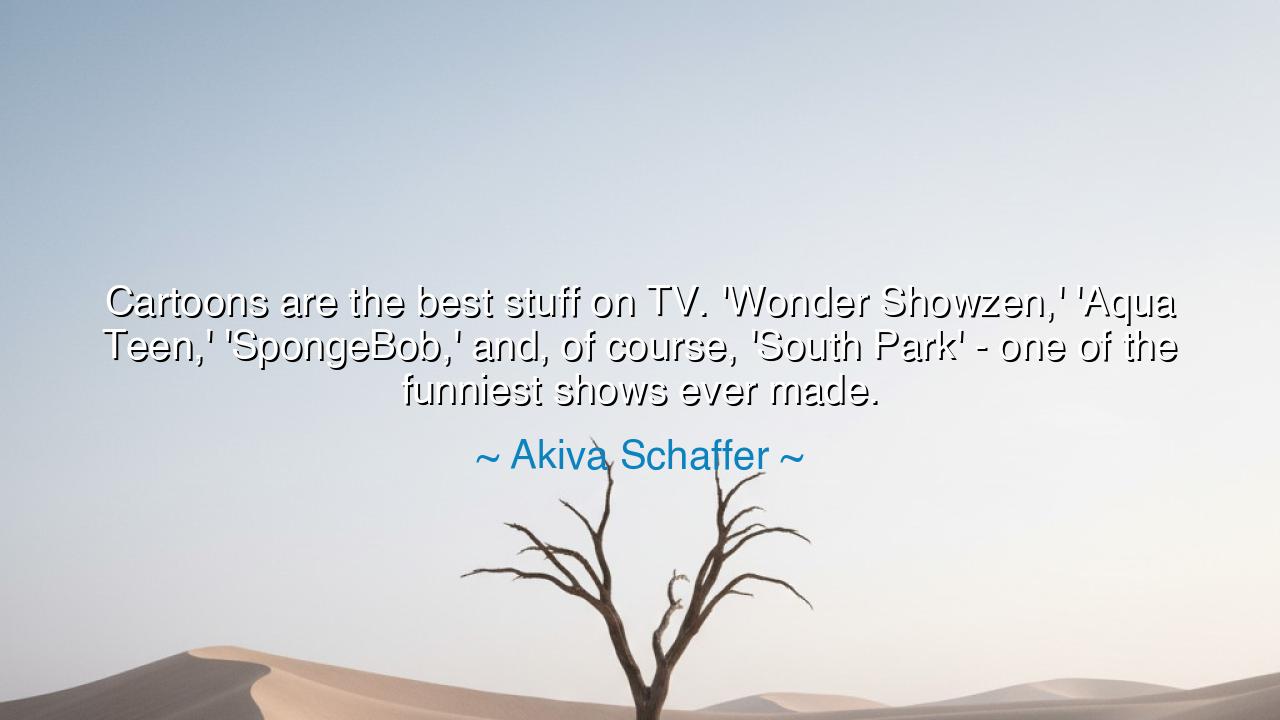
Cartoons are the best stuff on TV. 'Wonder Showzen,' 'Aqua
Cartoons are the best stuff on TV. 'Wonder Showzen,' 'Aqua Teen,' 'SpongeBob,' and, of course, 'South Park' - one of the funniest shows ever made.






Hearken, O children of the ages, to the spirited words of Akiva Schaffer, who extols the enduring power of cartoons as vessels of laughter, insight, and imagination. He celebrates shows such as Wonder Showzen, Aqua Teen Hunger Force, SpongeBob, and the incomparable South Park, declaring them among the funniest expressions of human creativity. In this reflection, we perceive a timeless truth: even in the guise of whimsy and absurdity, art possesses the power to illuminate, challenge, and delight, teaching through humor what might otherwise be obscured by the weight of life.
Since the dawn of human expression, stories clothed in fantasy and play have served as vessels of wisdom. In the amphitheaters of Greece, comedies by Aristophanes ridiculed folly, injustice, and hubris, provoking laughter while revealing profound truths. Schaffer’s observation is a modern echo of this practice: cartoons, though animated and seemingly trivial, carry the same dual power to entertain and enlighten, blending absurdity with social critique, imagination with reflection.
Consider the story of Walt Disney, who in his youth was captivated by simple, humorous sketches and animated shorts. These playful visions nurtured his creativity, ultimately giving rise to an empire of storytelling that blended amusement with profound narrative lessons. Akiva Schaffer’s admiration of cartoons mirrors this historical continuum: humor, absurdity, and imagination cultivate insight, shape perspective, and inspire the mind to see the world in new and unexpected ways.
Schaffer’s reflection also emphasizes the cultural significance of such works. Shows like South Park are not merely vehicles for laughter; they hold a mirror to society, exaggerating its flaws and contradictions, and provoking thought through ridicule and satire. Even the most fantastical characters—animated shapes, talking sea sponges, and anthropomorphic fast food—embody the human experience, exposing truth in forms that are both accessible and unforgettable.
The lesson is profound: humor and imagination are not frivolous; they are instruments of comprehension and resilience. By engaging with cartoons, one cultivates the ability to perceive irony, embrace absurdity, and confront discomfort with laughter. Humor teaches perspective, allowing the mind to navigate complexity with agility and grace, a skill as essential in ancient councils and courts as in modern life.
Practical guidance flows from this insight. Seek out art, literature, and media that provoke thought through humor and imagination. Observe the ways creators blend absurdity with truth, and allow yourself to engage fully with their visions. Whether animated, written, or performed, such works cultivate both critical insight and emotional flexibility, strengthening understanding of self, others, and the world.
Schaffer’s reflection further reminds us of the communal power of shared amusement. Just as ancient comedies were performed before gatherings of citizens, cartoons bring together audiences across generations, forging connection through laughter and shared recognition of folly and human eccentricity. In these moments, humor becomes a bridge between minds, a means of both entertainment and subtle education.
Therefore, take action: embrace the joy and insight of cartoons, observe their cleverness, and reflect upon their lessons. Let laughter illuminate understanding, and allow imagination to stretch the boundaries of perception. Akiva Schaffer’s words remind us that even in the most playful forms—animated, absurd, and fantastical—lies the power to teach, to provoke, and to connect, echoing the wisdom of the ancients across the ages.






AAdministratorAdministrator
Welcome, honored guests. Please leave a comment, we will respond soon